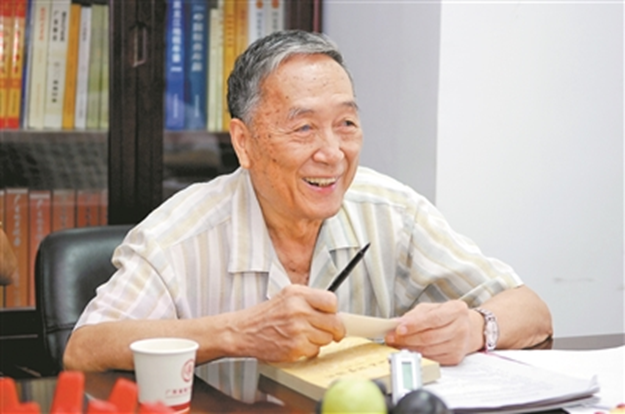- ABOUT JNU
- ADMISSION
-
ACADEMICS
- Schools and Colleges
-
Departments and Programs
- Arts College of
- Chinese Language and Culture College of
- Economics College of
- Electrical and Information Engineering College of
- Foreign Studies College of
- Information Science and Technology College of
- Environment School of
- Humanities School of
- International Business School
- International Studies School of
- Journalism and Communication College of
- Law School
- Liberal Arts College of
- Life Science and Technology College of
- Management School of
- Marxism School of
- Medicine School of
- Pharmacy College of
- Physical Education School of
- Science and Engineering College of
- Shenzhen Tourism College
- Research Institute
- Research Center
- Programs in English
- Majors
- Study Abroad
- Online Learning
- RESEARCH
- CAMPUS LIFE
- JOIN US
Retain Dialects, Preserve Historical Heritage: An Interview with Linguist Zhan Bohui
Author: Jiang Xiaodan
Publisher: People's Daily
Date: March 19, 2025
Zhan Bohui, a prominent linguist and former dean of the College of Liberal Arts at Jinan University, is a figure dedicated to the study and preservation of Chinese dialects. Born in 1931 in Chaozhou, Guangdong, he is currently a professor in the Department of Chinese and the honorary director of the Chinese Dialect Research Center. Zhan has significantly contributed to the field through works like Chinese Dialects and Dialects Survey and Overview of Guangdong Cantonese Dialects. Since 2013, he has led efforts to compile the Large Dictionary of Chinese Dialects, celebrated as a monument in the history of Chinese dialectology.

(Zhan Bohui)
A Life Dedicated to Linguistics
The first time I met Zhan Bohui was at his university office, where he, even at 94, displayed a focused demeanor while providing feedback on an article. His lifelong dedication to linguistic research is evident in his sharp intellect and passion for dialectology.
Zhan’s journey began in Chaozhou, where he was immersed in a bilingual environment, communicating with his father in Hakka and his mother in Teochew. This early exposure to languages sparked his interest in linguistics. Influenced by his scholarly father, Zhan chose to study linguistics at Sun Yat-sen University, the only university offering such a program at that time.
After graduating in 1953, Zhan began teaching at Wuhan University, where he published his first major work on the dialects of Hainan Island. His research involved deep field investigations, where he engaged with locals, meticulously documenting their dialects. This commitment to immersive research laid the groundwork for his future contributions to linguistics.
Field Research and Collaboration
In 1983, Zhan moved to Jinan University, where he continued to advocate for field research in linguistics over mere theoretical discussions. His approach is endorsed by his former student, Gan Yuen, who recalls how Zhan would lead students into the countryside, fostering a collaborative and sometimes challenging learning environment.
Under Zhan's leadership, significant works emerged, including Chinese Dialects and Dialects Survey and Overview of Guangdong Cantonese Dialects. Throughout his career, Zhan has authored over 40 books and published more than 400 papers, solidifying his place in the linguistic community.
The Quest for a Comprehensive Dialect Dictionary
In 2013, recognizing the need for an encyclopedic resource, Zhan spearheaded the project to create the Large Dictionary of Chinese Dialects. He describes it as the first of its kind in Chinese history, intending to document the vast landscape of dialect research comprehensively.
The compilation process was complex, requiring a diverse team of over a hundred collaborators from different generations, including elderly, middle-aged, and young researchers. Zhan emphasized the importance of rigorous standards for entries and sought to reflect the historical development of dialectology within the dictionary. After four years of painstaking effort, the massive 4.65 million-word dictionary was completed—a testament to Zhan's commitment to linguistic scholarship.
A Legacy of Mentorship and Research
Throughout his career, Zhan Bohui has not only focused on research but also on nurturing future generations in the field of dialectology. He founded the first comprehensive dialect research institution in China at Jinan University in 1984 and became the first dean of the newly reestablished College of Liberal Arts in 1985. His work laid the foundation for advanced studies in Chinese dialects, leading to the graduation of the first doctoral students in the field in 1994.
Zhan has trained numerous doctoral and master's students, many of whom have emerged as influential figures in Chinese dialectology. His passion for the subject and dedication to fostering talent ensure the continued growth and relevance of dialect studies in China.
In conclusion, Zhan Bohui's contributions to linguistics encapsulate a lifelong commitment to the preservation of dialects and the cultural heritage they represent. His belief in the importance of language as a resource drives ongoing efforts to document and promote the richness of China's linguistic diversity.
NEWS
- About the University
- Quick Links
Copyright © 2016 Jinan University. All Rights Reserved.




